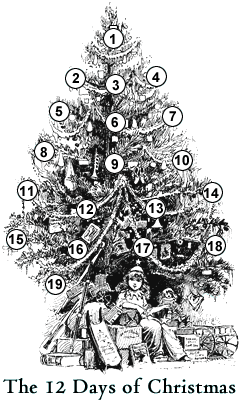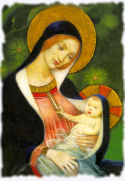
January 1, Solemnity of Mary, Mother of God

 Although
New Year's Day is not celebrated by the Church, this day has been observed
as a holy day of obligation since early times due to the Solemnity of
Mary, Mother of God. Each family and country has different traditional
foods to eat on New Year's Day, with lentils being the main superstition:
ill luck befalling those who do not eat lentils at the beginning of
the year.
Although
New Year's Day is not celebrated by the Church, this day has been observed
as a holy day of obligation since early times due to the Solemnity of
Mary, Mother of God. Each family and country has different traditional
foods to eat on New Year's Day, with lentils being the main superstition:
ill luck befalling those who do not eat lentils at the beginning of
the year.
New Year's is a day of traditional hospitality, visiting
and good cheer, mostly with a secular view, but there is no reason that
this day, too, could not be sanctified in Christ.
Catholic Culture
++++++++++++++++++++++++++++++
iBreviary
Office Reading
From a letter by Saint Athanasius, bishop
(Epist. Ad Epicetum, 5-9; PG 26, 1-58, 1062, 1066)
The Word took our nature from Mary
By taking our nature and offering it in sacrifice, the Word was to destroy it completely and then invest it with his own nature, and so prompt the Apostle to say: This corruptible body must put on incorruption; this mortal body must put on immortality.
This was not done in outward show only, as some have imagined. This is not so. Our Savior truly became man, and from this has followed the salvation of man as a whole. Our salvation is in no way fictitious, nor does it apply only to the body. The salvation of the whole man, that is, of soul and body, has really been achieved in the Word himself.
What was born of Mary was therefore human by nature, in accordance with the inspired Scriptures, and the body of the Lord was a true body: It was a true body because it was the same as ours. Mary, you see, is our sister, for we are all born from Adam.
The words of Saint John: The Word was made flesh, bear the same meaning, as we may see from a similar turn of phrase in Saint Paul: Christ was made a curse for our sake. Man’s body has acquired something great through its communion and union with the Word. From being mortal it has been made immortal; though it was a living body it has become a spiritual one; though it was made from the earth it has passed through the gates of heaven.
Even when the Word takes a body from Mary, the Trinity remains a Trinity, with neither increase nor decrease. It is for ever perfect. In the Trinity we acknowledge one Godhead, and thus one God, the Father of the Word, is proclaimed in the Church.
RESPONSORY
O pure and holy Virgin,
how can I find words to praise your beauty?
– The highest heavens cannot contain God whom you carried in your womb.
Blessed are you among women,
and blessed is the fruit of your womb.


No comments:
Post a Comment